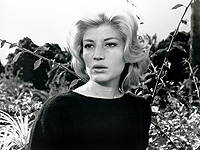Is It Really a Great Movie? Part Twenty-Nine: L'Avventura
by dan heaton
Using Roger Ebert's Great Movies book as a guide, this series of articles will focus on all films included on his list that previously have escaped my notice. Since all lists are subjective, I am not treating Ebert's choices as the essential selection of films. However, his essays offer the perfect chance for me to explore both classics and lesser-known pictures from around the globe.

Italy's Michelangelo Antonioni received considerable international acclaim during the '60s for artistic films like La Notte, L'Eclisse, and Blow Up — which earned a large American audience. Many experts hail 1960's L'Avventura (The Adventure) as a masterpiece, but the reaction has not always been positive. Audience members booed the slow-moving picture at the Cannes Film Festival, but it still won the Jury Prize there. It also received several BAFTA nominations, most notably for star Monica Vitti as Best Foreign Actress. I did see Antonioni's Blow Up several years ago, and found it surprisingly dull and ineffective. Would this film generate a similar negative response?
Our narrative begins just before a yachting trip between upper-class socialites enjoying a holiday. Anna (Lea Massari) quarrels with her uncaring father and joins her best friend Claudia (Monica Vitti) for a drive to pick up her older boyfriend Sandro (Gabriele Ferzetti). The striking young women appear carefree, but we quickly see cracks in Anna's façade that might reveal a troubled soul underneath. Her interactions with Sandro are especially awkward and reveal a couple who have strong physical attraction but little beneath the surface. Anna recognizes their relationship's limitations, but appears resigned to the unfortunate state. During the boating trip, she craves attention from everyone, even falsely spotting a shark while swimming near a rocky island. Claudia obviously adores her friend, but even their relationship seems to lack a true closeness of a natural friendship. When Anna mysteriously vanishes on the island, Sandro and Claudia search persistently for her in numerous towns across Italy. It's unclear if Anna is truly "lost" or just wants to remain on her own. Her disappearance seems like a pivotal moment to drive the plot, but viewers expecting a satisfying conclusion should prepare for disappointment.
In one of his earliest pictures as a cinematographer, Aldo Scavarda deserves major credit for presenting captivating black-and-white images. Little happens for extended periods, and only Scavarda's stunning photography keeps the shots interesting. After Anna's disappearance, the focus shifts to Sandro and Claudia's affair, which initially appears promising but quickly reveals his inability to truly love anyone. While they continue the search, Claudia begins to care more about Sandro than finding her friend. The journey takes them to several memorable locations, including a strange, deserted town and a street filled with leering men. That effective sequence showcases Claudia's insecurities and reveals a fearful side to her usually positive demeanor. These individual scenes are effective, but they reside within a slow, lengthy picture that runs more than two hours and 20 minutes. Rich, self-centered individuals from the yachting trip appear for short interludes, but the overall plot contains little drive to reach its conclusion. Antonioni appears more concerned with framing interesting shots and incorporating hidden meanings than developing the narrative.
Roger Ebert explains how L'Avventura becomes a "place in our imagination — a melancholy moral desert." This eloquent statement does apply to this picture, but it also overstates the story's power. Antonioni depicts sad, but carefree characters that initially attract our attention but slowly outstay their welcome. It becomes difficult to care much about upper-class figures who do little but struggle to stay afloat. Memorable, remarkable images appear periodically and make an impact, but I would fall short of labeling L'Avventura a Great Movie. I can appreciate Antonioni's impact on critics and film lovers around the world, but don't enjoy his unique style enough here to give a stronger recommendation. Making the audience "work" is usually positive. Digging into this often-inexplicable tale just pushes us too much in that direction.
Copyright (c) 2007 erasing clouds |
|